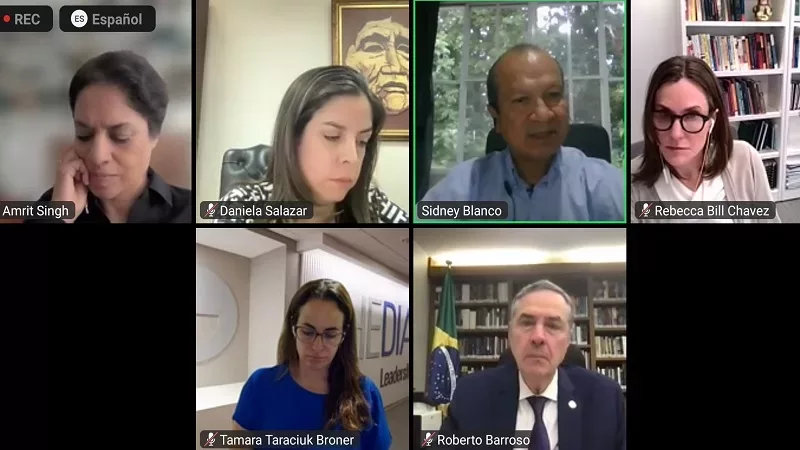Judicial independence has been broken, there is intimidation against judges and there are no institutions that exert control over the Executive, warned the former magistrate of the Constitutional Chamber of the Supreme Court of Justice (CSJ), Sidney Blanco, who expressed that the judges are “alienated” to the guidelines of the government.
“Obviously, as these magistrates of the Constitutional Chamber directly obey the policies of the Executive, also the Supreme Court and the Constitutional Chamber of which it is a part, has intimidated the judges. That is, the judges cannot act independently”
Sidney Blanco, former magistrate of the Constitutional Chamber
Blanco gave his position at the forum “The Role of the Judiciary in Electoral Contexts: A View from Latin America”, developed this Tuesday by the Rule of Law Impact Laboratory of the Stanford Law School and Inter-American Dialogue.
When asked about the role of the highest court in the face of abuses that may be committed by lower courts, he said that the CSJ is responsible for the disciplinary regime of the lower judges, and that some judges align themselves with the guidelines of the Supreme Court, which in this case would be the magistrates that were put in by Nuevas Ideas in May 2021.
Aligned Judges
He indicated that it is more noticeable in criminal matters since the exception regime that suspends fundamental guarantees is in effect. “And all judges are aligned with the guidelines that emanate from the Executive itself. Therefore, I believe that currently judicial independence in the country, at any level of knowledge, is broken, it is disconnected from constitutional obligations”, he expressed.
He added that the government has co-opted not only the Legislative and Judicial organs, but also control institutions such as the Supreme Electoral Tribunal (TSET), the Government Ethics Tribunal (GET), the Institute for Access to Public Information (IAPI) and the Office for the Defense of Human Rights (ODHR).
Exmagistrado: la independencia judicial en el país se ha roto
La independencia judicial se ha roto, hay amedrentamiento contra jueces y no existen instituciones que ejerzan un control sobre el Ejecutivo, advirtió el exmagistrado de la Sala de lo Constitucional de la Corte Suprema de Justicia (CSJ), Sidney Blando, quien expresó que los jueces están “alienados” a las directrices del gobierno.
“Obviamente, como estos magistrados de la Sala de lo Constitucional obedecen directamente a las políticas del Ejecutivo, también la Corte Suprema y la Sala de lo Constitucional de la que forma parte, tiene amedrentados a los jueces. Es decir, los jueces no pueden actuar con independencia”
Sidney Blanco, exmagistrado de la Sala de lo Constitucional
Blanco brindó su postura en el foro “El Rol del Poder Judicial en Contextos Electorales: Una Mirada desde América Latina”, desarrollado este martes por el Laboratorio de Impacto del Estado de Derecho de la Facultad de Derecho de Stanford y Diálogo Interamericano.
Ante la pregunta de cuál es el papel que juega el máximo tribunal ante los abusos que puedan cometer los juzgados de menor instancia, dijo que a la CSJ le corresponde el régimen disciplinario de los jueces inferiores, y que algunos jueces se alinean a las directrices de la Corte Suprema, que en este caso sería a los magistrados que fueron puestos por Nuevas Ideas en mayo de 2021.
Jueces alineados
Indicó que es más notorio en materia penal desde que está vigente el régimen de excepción que suspende garantías fundamentales. “Y todos los jueces están alineados a las directrices que emanan del propio Ejecutivo. Por lo tanto, creo que actualmente la independencia judicial en el país, en cualquier nivel de conocimiento, está roto, está desvinculada de las obligaciones constitucionales”, expresó.
Agregó que el gobierno ha cooptado no solo a los órganos Legislativo y Judicial, sino también a instituciones de control como el Tribunal Supremo Electoral (TSE), el Tribunal de Ética Gubernamental (TEG), el Instituto de Acceso a la Información Pública (IAIP) y la Procuraduría para la Defensa de los Derechos Humanos (PDDH).

